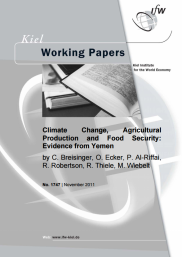
Climate Change, Agricultural Production and Food Security: Evidence from Yemen

Abstract:
This paper provides a model-based assessment of local and global climate change impacts for the case of Yemen, focusing on agricultural production, household incomes and food security. Global climate change is mainly transmitted through rising world food prices. Our simulation results suggest that climate change induced price increases for food will raise agricultural GDP while decreasing real household incomes and food security. Rural nonfarm households are hit hardest as they tend to be net food consumers with high food budget shares, but farm households also experience real income losses given that many of them are net buyers of food. The impacts of local climate change are less clear given the ambiguous predictions of global climate models (GCMs) with respect to future rainfall patterns in Yemen. Local climate change impacts manifest itself in long term yield changes, which differ between two alternative climate scenarios considered. Under the MIR scenario, agricultural GDP is somewhat higher than with perfect mitigation and rural incomes rise due to higher yields and lower prices for sorghum and millet. Under the CSI scenario, positive and negative yield changes cancel each other out. As a result, agricultural GDP and household incomes hardly change compared to perfect mitigation.
Keywords: Climate Change, Agriculture, Food Security, Model-based Assessment, Yemen
- Issues:
- Climate Change, Natural Resources
- Region:
- Middle East and North Africa
- Country:
- Yemen
- Year Published:
- 2011
- Authors:
- Richard Robertson, Clemens Breisinger, Olivier Ecker, Perrihan Al-Riffai, Rainer Thiele, Manfred Wiebelt
- Institution:
- Kiel Institute for the World Economy

